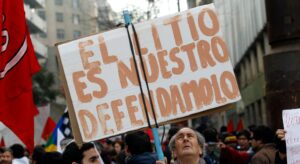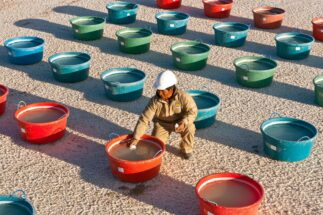A six-hour drive from the US border, in the mountains of Mexico’s Sonora desert, a lithium deposit dubbed “the biggest in the world” sleeps under 100,000 hectares of cattle ranching country.
The deposit has been the subject of considerable speculation, attracting much media attention in recent years. Though dozens of outlets have reported that the reserve was the largest ever found, the Mexican geological service and the Mexican mining chamber have since stated that the lithium in the Sonora deposit is not so significant – and in the words of the head of the geological service, Flor de María Harp, certainly not “the largest in the world”.
De María Harp was also quoted as “revealing” that lithium in Sonora is, in reality, “just clay”– a reference to the Sonora lithium being found in clay rather than brine, a characteristic that requires special and potentially costly technology to extract.
As questions have circulated over the deposits, developments in exploration, let alone exploitation, have also appeared to slow for Bacanora Lithium, the now Chinese-owned, formerly UK-listed company that owns ten concessions in Sonora. Meanwhile, a debate around lithium nationalisation, driven by Mexico’s president Andrés Manuel López Obrador, has raised concerns over the future role of private companies in the country’s sector.
Amid these uncertainties, Diálogo Chino travelled to Sonora to see how the project was progressing and hear from local residents caught between the promise and perils of a potential mining boom.
A struggling town hopes for change
On 26 July, we visited the mining exploration site, driving about three hours from the village of Bacadéhuachi through peaks and valleys greened by a recent bout of rain. Cattle and cacti lined the dirt roads, and red cardinals and eagles circled in the sky.
The Bacadéhuachi municipality has its seat in the small village of the same name, and is currently home to less than 1,000 people. Over the past two years, they have witnessed the media buzz around the reserves located near their town.
Approaching the mining site, the altitude increased, and the rock skirting the road began to turn chalky in colour.

Like other Bacadéhuachi residents, Javier Figueroa, president of the Bacadéhuachi ejido – a form of collectively-owned farmland unique to the Mexican system of land ownership – wants to know what’s going on.

The ejido president also told us of a persistent concern amongst the town’s population regarding the environmental costs of lithium mining, with awareness of reports that, in resource-rich Sonora, mining of other materials such as copper and gold has already caused contamination.
“As we have seen with other mines in other places, at the end of the day they contaminate the agriculture… we start to see environmental deterioration everywhere, it doesn’t pay off,” Figueroa said.
There’s no work here. Many people have left to find work. Perhaps they will come back if there’s a company to work for
One of Mexico’s worst mining accidents occurred about 180 kilometres east of Bacadéhuachi in 2014, when mining firm Grupo Mexico spilled nearly 40,000 cubic metres of copper sulphate acid solution into the Sonora River. The river was contaminated, causing illness in residents and killing animals who drank from it – a disaster that lives on in recent memory.
Francisco “Pancho Paleta” Villaescusa runs the general store in the main street of Bacadéhuachi, looking out onto the palm-lined central plaza in front of the church. He told Diálogo Chino that the town has been hoping the lithium deposit would bring their economy back to life.
“There’s no work here,” Villaescusa said. “Many people have left to find work in another state or in the US. Perhaps they will come back if there’s a company to work for.”

Among the Bacadéhuachi residents we spoke with, many shared similar sentiments over a lack of jobs, and a lack of water: the region is among those most affected by severe drought in Mexico.
The miners
The Sonora Lithium Project comprises ten concessions and is operated by Bacanora Lithium, a company that began purchasing the land in 2009 and commenced minor exploration activities in 2010. The company, previously a Canadian-British venture, installed a pilot plant in Sonora’s capital city Hermosillo in 2013, while a feasibility study conducted in 2018 found that profitable lithium mining could occur on the sites.
In 2019 Chinese mining giant Ganfeng Lithium acquired a 29.9% stake in the project as a cornerstone investor, as exploration activities continued. Then, at the end of 2021, it confirmed a takeover of Bacanora, with Ganfeng vice president Wang Xiaoshen appointed as its chairman in January.
Dr Rafael Cabanillas, director-general of energy programmes for the Sonora government’s economy ministry, emphasised that it is early days for the project, which has so far run through concessions. The government has however expressed great interest in exerting more control over its lithium resources, culminating in the recent launch of a state-run lithium company, Litio para Mexico, abbreviated as LitioMX.

Cabanillas told Diálogo Chino that it is not yet clarified how Sonora’s lithium will be extracted and, as such, whether it will require a high concentration of water. He said that both the Sonora and federal governments are prioritising bringing benefits to Bacadéhuachi and the Mexican people through LitioMx and its partnerships.
Meanwhile, a report published on 12 September by Mexican outlet N+ accused Bacanora of providing “incomplete, contradictory and misleading information to investors and the Mexican government” regarding the company’s acquisition of the Sonora concessions. Their report says that one of the concessions Bacanora claims to have covers 87% of the land that originally comprised the project, but is not actually presently assigned to the company.
N+ says the company has used speculation to drive up profits while not extracting any lithium. In the report, Napoleón Gómez Urrutia, a senator from ruling party Morena and a mining union leader, also tells N+ that the federal government is reviewing all lithium mining concessions to see if there were any problems with their acquisition, and that the new mining law would address speculation.
What is the plan for Sonora lithium?
Bacanora’s 2021 annual report stated that a Chinese design institute was being appointed by Ganfeng to complete the front end engineering design (FEED) that occurs following feasibility studies in mining projects, with, it said, “initial site layouts scheduled for Q2 2022”.
The report also claimed that all other plant site location activities have been completed. “Works to build the construction road and early work camp have commenced” and “site works for bulk earthworks are expected to commence in late 2022”.
Meanwhile, a project development timeline on Bacanora’s website states that long lead items, likely to include imported equipment and materials, are “to be ordered for delivery to Sonora in late 2022 and early 2023”, while the “first lithium plant commissioning [is] planned for late Q4, 2023”. It does, however, emphasise that these dates are subject to change.
Diálogo Chino made several approaches to Bacanora for comment, seeking updates on the current status of the site and plans going forward, but received no response. Requests for comment from Ganfeng were also unanswered.
It seems clear that the company intends to continue the mining operation in Sonora: they have hired a community relations and sustainability officer, and also advertised for a project manager. But there was little sign of progress at the site of the mine, with the camp appearing as nothing more than a large patch of grass and no people or machinery from the company in evidence. One Bacadéhuachi resident did tell us that in recent weeks there appears to be movement on the project again, and reported that some residents had been receiving enquiries about houses available for rent, which they presumed to be from relatives of company staff.
Nationalising lithium in Mexico
Ever since the discovery of the deposits, Mexico’s president Andrés Manuel López Obrador, known as AMLO, has made regular declarations relating to Mexico’s ownership of its lithium, and decreed the creation of the state-operated lithium mining company LitioMX on 23 August. A week later, it was announced that the company will be headquartered in Hermosillo with the Sonora state government.

“Lithium is a strategic mineral that must remain under the control of the nation,” the president had said in a 2021 press conference. “Lithium matters a lot to those who act as hegemonies. We cannot leave this strategic mineral to the market.”
Ownership of the concessions has been in the spotlight, with Mexico recently passing a law to nationalise lithium as a strategic mineral for the country, a move which has been seen as potentially limiting foreign involvement in lithium mining. It has also brought the López Obrador government conflict with its North American trading partners, who have claimed that this breaches the US-Mexico-Canada free trade agreement.
The Sonora economy ministry’s Cabanillas said that a relationship between Bacanora and LitioMx “has not been established”, but he expects that, going forward LitioMx will have relationships with “universities and research centres as well as private companies”.
The decree says that LitioMx will “manage and control the activities necessary for the production, transformation and distribution of lithium-derived products, for which purpose it may associate with other public and private institutions.” Meanwhile, AMLO himself said in a recent news conference that private investment would be encouraged in cooperation with the state-run company. The president has also claimed that Sonora’s lithium will be linked to a new local economy in renewable energy.

In nationalising lithium while permitting foreign exploitation of its deposits, and downplaying the profitability of the Sonora Lithium Project while playing up its benefits to the economy and sovereignty, the Mexican state is playing a rather ambiguous hand. The people of Bacadéhuachi, meanwhile, are just hoping to not get left behind.
Resident Javier Romero said he was sceptical about the lithium in the mountains being a saviour for the town. “They say it’s the new gold, for making electric batteries,” he told us as we met him in the street, adjusting the cables on his decades-old car battery. “I’ll believe it when I see it.”








